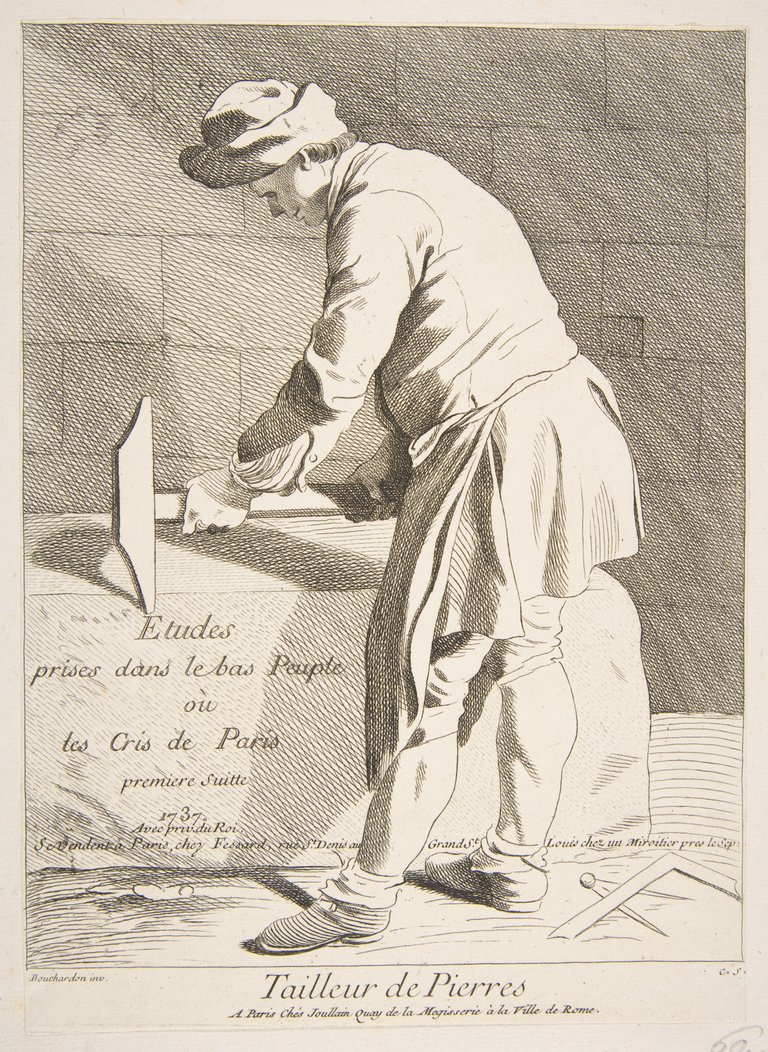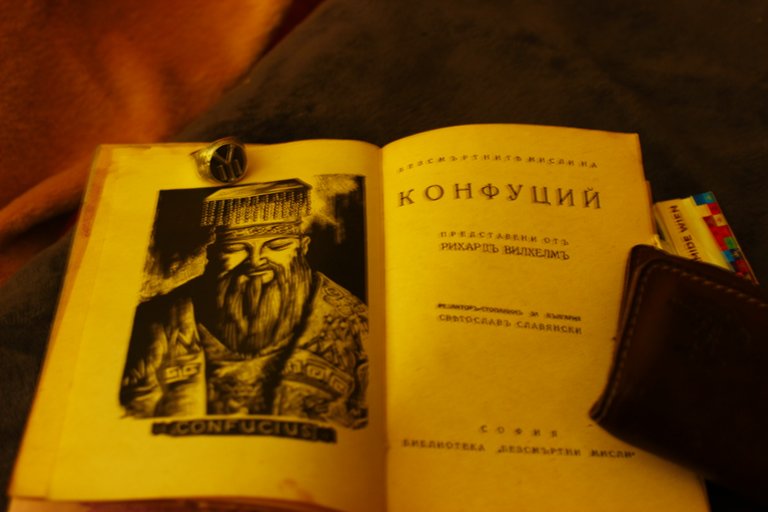
Two of the people, who inspired me to study philosophy are definitely Lao Tzu (or Laozi) and Confucius. They, together with Aristotle and Nietzsche, were my first authors who opened the door to philosophical knowledge for me. As I go further into my studies I start to see more and more differences between the two schools of philosophy, if I may call them so. The west vs the east (coast mothaf**ka).
Thus in this short post, I would like to show you the beauty of eastern philosophy and why I find it so different than its counterpart.
Let's begin my dear viewer.
The meaning of the circle
The main differences between western and eastern philosophy are the goals and ways towards their achievement.
Antique Western philosophy up until Medieval Philosophy tried to answer questions of immortality, sin, God, and virtues. It discussed the meaning of life as a strive towards a better moral and closeness to God. Another typical trait of western philosophy is its deduction and categorization, which continues strong up to this day.
If we take a modern western philosophical school, such as phenomenology, we will see the will to deduct reality in its purest form and details. To deduct an experience and categorize it as such and such and so and so. To categorize phenomena and put them in their labeled ontological drawers.
The man is rational in western philosophy. The man is individual. Logic dictates actions and thoughts. And the end? The end is one. The end is linear.
Eastern Philosophy, on the other hand, believes in unity. God is in the material world, as the material and spiritual world is entangled. Only one reality exists. Nothing can be labeled as everything is one. Nothing can be deducted, because "if you focus on the leaf, you miss the tree, if you focus on the tree, you miss the forest" ( a lazy attempt to quote Monk Takuan's work "The Unfettered Mind"). Seeing everything in its wholeness is encouraged. Every religion has the same core. Man and woman are only man and woman when they are together. Individuality is pointless, as you are the same as the leaf, stone, tree, boulder, forest, mountain, God and Universe. And the End? The End is infinite. The End is simply a circle.
The Eastern Philosophy encourages acceptance, whereas its counterpart - control.
The reason for this is, in my opinion, the judging God and Society. In western culture, there is always a Judge, no matter the religion. Your actions, your thoughts, your life is based upon rules dictating your behavior and the end result... Heaven or Hell.
This linearity and judgment can make a person go crazy. Feeling suffocated in his own sand clock as he falls into the abyss, waiting to see if he did well on earth. Keeping this in mind, it is fully logical, that man will try to think hard in order to become the best version of himself and fight off the chains of religion and social judgment.
In eastern philosophy, there is no judge. Only man can judge himself. The circle of life also gives hope and power, which encourages one to accept his life and do the best he can to enjoy it, rather than fight it. You will be granted another one, so whats the point of wanting to change this one?
The Stonecutter and the Fisherman
Recently I listened to one podcast, which inspired me to think about this topic and eventually write about it.
The podcast is called "The Stonecutter and the Tao of Rock-Paper-Scissors" by Sam Yang. ( I will post the link at the end of the post, so do check it out. )
In this podcast, the author tells a really interesting comparison between two stories, which I would like to retell (more amateur and in my own style, I'm sorry : C) in the interest of this topic.
The Stonecutter.
A man who worked as a Stonecutter once went to the mountain in search of boulders to cut. There he suddenly came to meet a powerful mountain spirit, who suddenly appeared before him, telling him that every wish he makes will manifest itself into reality and just as suddenly disappeared afterward. The man astonished, continued his work thinking of how crazy he has become. Finished for the day, with the rocks sold for little money, the poor stonecutter bought a bowl of rice and went home. As he chewed on the rice he grew angry of the tastelessness of his food and screamed:
-I WISH I HAD A NORMAL DINNER.
In his surprise, the spirit answered.
-Your wish was heard and so was it granted.
Before the man appeared so much food, that he never even dreamed of.
Happily, the man fell asleep.
On the next day, he went to work again and the sun was brutally hot. The poor stonecutter saw a prince passing by carried by his slaves in a silk carriage, which protected him from the sun. Again, angered by his fate the stonecutter screamed:
-I WISH I WAS A PRINCE!!
-Your wish was heard and so was it granted.- responded the mountain spirit.
Suddenly the stonecutter was a prince, with servants and wind blowers, beautiful women and no responsibilities at all. He was happily carried around the village, but at some point, the strong sun had burned his face. Angered, the stonecutter screamed:
-WHAT DOES IT THINK IT IS THIS SUN! DOES IT THINK IT IS MORE POWERFUL THAN I?!? I WISH I WAS THE SUN!
-Your wish was heard and so was it granted.
And so the stonecutter became the sun. Angry and furious he sends beams across the land. But at one point a cloud blocked him and he got even more furious:
-WHAT DOES IT THINK IT'S DOING THIS STUPID CLOUD. DOES IT THINK IT IS MORE POWERFUL THAN I?!!??! I WISH I WAS A CLOUD!!
-Your wish was heard and so it was answered.
And so the stonecutter was transformed into a cloud. He went back and forth. Blowing wind here and there. Pouring rain over everything he saw, until he poured rain and blew wind over a rock, which declined to move. Angry did he shout:
-WHAT IS THIS ROCK DOING!? DOES IT THINK IT IS MORE POWERFUL THAN A MIGHTY CLOUD?!? I WISH I WAS THE ROCK!
-You wish was heard and so was it granted.
And the stonecutter became the stone. He sat there angry and almighty, until one day a stonecutter came and started chopping at him. He chopped and chopped until he broke the stone in half. The stone finally understood and calmly asked.
-I do wish I was a man again.
-Your wish was heard and you will be a man once more.
And so the cycle was complete. The poor stonecutter finally understood his meaning and continued to live his life with a smile, until the day he died.
The End.
The Fisherman and the Goldfish

Once lived a humble old fisherman with his wife. Both of them lived in an old hut near the river.
One day the fisherman went to work and to his surprise, he did not manage the catch anything the whole day.
Just before he gave up he caught a small goldfish. Just as he was about to pull her in the little fish spoke in his language:
-Dear Fisherman, I am a magical fish and I grant wishes. Please do spare my life and I will grant you one wish.
The old man surprised and confused answered back:
-Dear Fish, I hold no grudge against you and I hold no deep desire you are free to go.
And so he let the fish back in the water.
As he went back home, his old wife saw he had no catch and asked him:
-Why didn't you manage to catch anything? What did you do all day?
-The water was fast today- replied the fisherman- but I did manage to catch a magical goldfish. It said it will grant me wishes if I put it back in the water. Yet, I didn't feel like wishing for anything.
-You old fool! - Screamed the old lady - Look at what poverty we live in. Go and ask the fish to give us a good house at least.
And so the fisherman went on the next day to ask the golden fish for a wish. He sat and sat near the river bench and suddenly the goldfish came.
-What is bothering you, o humble fisherman? What can I do for you?
-You see, dear fish, my wife is not happy with our lives, please do grant us a beautiful and big house. - asked the fisherman
-So it is done. Go back and see for yourself.
When the old man went home, he was greeted by a big green garden full of farm animals, beautiful doors, and amazing architecture. His old wife was standing there, jumping and smiling.
But only after a few days she grew unhappy again.
-This house is pointless if we don't have money and servants. Go and ask the fish.
-I don't think it is necessary- replied the old man.
-Go you fool, she is surely going to grant you such a small wish.
And so the fisherman went and spoke with the fish. When he came back he saw a full house and a big wagon full of gold coins.
The old wife was silent, but for a short while. After a few days she came with a new demand:
-These coins were spend fast and the servants don't do much anyway for the house. Go and ask the fish for a castle with a big treasury and a lot of servants. Cooks, cleaners, jugglers and so on.
-This is too much.- replied the old humble man- we need not so many stuff.
-Go you fool or I will leave you.
And so the man went and so was his wish granted again. He came back to a big castle with a lot of servants and gold. Yet the granny was still unsatisfied. Her lust for power grew larger.
-It is pointless to have a castle without being a king and queen. --she commented- Go and ask the fish this small favor.
-I refuse.- said the old wary man- There is no stop to this.
-Go or you are not gonna live here anymore!
And so went the fisherman to the river again.
-O fish, my friend. I have another wish to make.
-What is it this time?- asked the fish angered.
-My wife wishes to be the queen of this kingdom.- Said the fisherman calmly.
-This is too much. Go back to your home!
And so the fisherman went back home, but for his astonishment, he saw his old poor hut and his wife seating at the front porch.
It is said, that they live so until this day.
The End.
And the moral of the story is...
Both of this stories resemble the same message, but with a different approach. If you are not familiar with any of them, try to guess, which one accounts to western culture and which one to eastern.
Take a break.
The stonecutter is the eastern version of the Goldfish story, originally written by Pushkin. Both stories strive to show, that one should be happy with what one has. The Stonecutter story shows it by enabling the man to relive different types of existence, thus coming to the conclusion, that his own is actually the best one. He comes to this conclusion trough himself. We can say, that he became enlightened. There was no one to judge him for his actions, no one to punish him for his decisions, but himself.
The goldfish story shows in a way the same scenario. The exception is that the old woman's choices are judged by the fish and are also taken away by the fish. The conclusion of the lesson does not come through self-understanding, but rather trough punishment, which is typical for our western culture.
Thus I come to my first important message from this post.
In eastern philosophy you are the master and teacher of yourself. You are the one who is supposed to understand how to cherish one's life. Accept what is and love what is. (this saying is something i got addicted to by Dr. Robert Puff podcasts. That is how he ends them. Will link them down below.) That is the message of eastern teachings
The shortest time is sometimes achieved by the shortest road.
Another thing I love about eastern philosophy is the way it presents itself. Of course, every school differs in its methodology of teaching. But one thing they have in common is simplicity.
Simplicity should not be confused with language limitation. Under language limitation I mean, that if one idea is not presented in, for example, four books, then the idea is not well presented. In my opinion, an idea can be perfectly presented in one sentence. That in itself is an art.
One could say, that it is rather abstract, and one could be right about that. But in this abstract and poetic world of eastern philosophy, one can find many truths and many lessons, which are typically really hard to understand and express.
To underline this point, let's look at two quotes. One from Confucius and one from Lao Tzu.
Confucius.
"When the mind is not at its place, we look, but do not see; we hear, but do not understand; we eat, but we do not know the taste of the food. This shows that the perfection of man hangs close with the clear mind." (Translated by me from "Confucius" by Richard Wilhelm, p. 82, publisher Bibliothek "Immortal Thoughts", Sofia, the year 1941)
This is the first type of eastern philosophy. Done by short metaphors, mostly found in dialogues with teacher and student.
One famous example of this is as follows:
Ji Lu (a student of Confucius) once asked the teacher why they never spoke about ghosts, demons, and creatures from the afterlife. Why didn't they learn about death in general? To this the teacher responded:
-You haven't understood life yet and you want to understand death?
(As recreated by my mind from the time I read this)
As you can see, dear viewer, both of these are simple sentences, which entail a lot of truth in them. I will not go further to interpret them, as I think they are obvious and if not, you are your teacher, I am simply the messenger.
Lao Tzu
As I write this sentence I have the book from Lao Tzu in front of me.
Now I will randomly open it and write the first lesson I see.
So it goes:
"The Path (Dao) is beyond the senses and the memory. The Path is the source of the whole world. How can I understand the source of the world? - By accepting it." (Translated by me from the book "The Path" by Lao Tzu, page 74, published by FAMA, Sofia, year 2011, ISBN 978-954-597-409-0)
Again I will not interpret it, I simply want to show you the beauty of this short sentences. Read them slowly and enjoy them. Breathe together with the words. Accept them and deny them. Remember them and forget them. Because:
"Who doesn't want anything, has everything." (Lao Tzu)
The circle comes to an end
I think this post became too long and I hope I did some justice to the beauty of eastern philosophy. I really want you to delve deeper into the philosophy of Confucianism, Taoism, Sun Tzu, Mozi, Zhuangzi and many more. I do hope I return to them. As everything that they worked upon can be traced into today's world. Manga, Video Games, Animes, Movies, Books and most importantly Life.
There is much more to discuss. Questions which I would ask myself are:
The Socratic dialogues are similar to those of Confucius. What are the differences?
Can you really categorize philosophy? Is it not one?
Why do we divide the two?
There are many western thinkers who said similar stuff. What are the differences?
and last but not least some questions to you dear viewer.
Do you agree with my points?
What is your favorite philosophy school?
Is everything besides western philosophy, philosophy at all?
and
most
importantly
How was your day?
Yours truly,
Monstroz.
Sources: Image 1) https://www.pexels.com/photo/cherry-blossom-92340/
Image 2)  Image 3) https://pixnio.com/sport/fishing-and-hunting/silhouette-of-fisherman-on-the-sea-water-in-sunset
Image 3) https://pixnio.com/sport/fishing-and-hunting/silhouette-of-fisherman-on-the-sea-water-in-sunset
Both of them are great speakers and interesting minds. I do recommend them.Podcasts - Sam Yang- "The Stonecutter and the Tao of Rock-Paper-Scissor." https://tunein.com/radio/Must-Triumph-p1118131/?topicId=121264145
Dr. Robert Puff - http://www.happinesspodcast.org/
